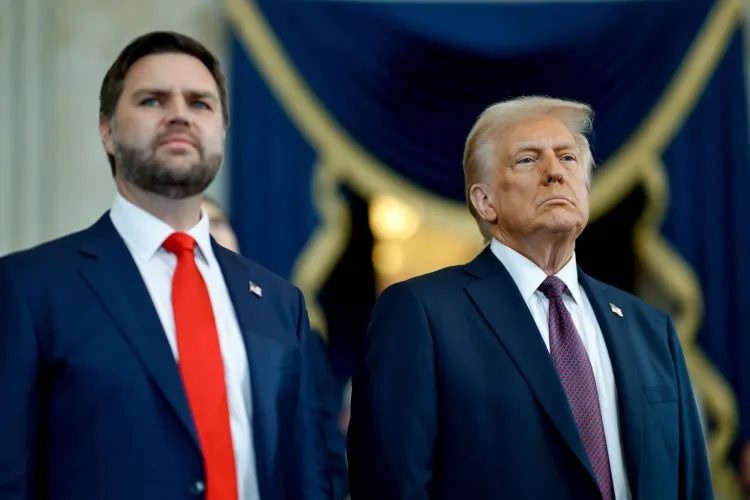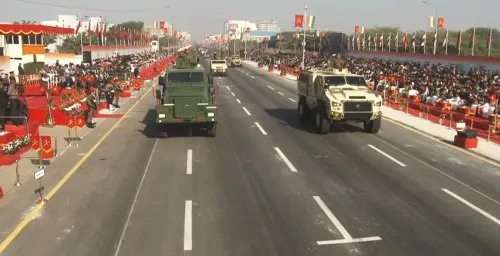Is Trump's Kashmir Proposal a Risky Diplomatic Move?

Synopsis
Key Takeaways
- Trump's Kashmir proposal raises alarms for India.
- India maintains its stance against third-party mediation.
- Kashmir's geopolitical significance is crucial for US interests.
- External involvement could destabilize regional dynamics.
- India must prioritize its sovereignty in the face of global pressures.
New Delhi: On May 10, US President Donald Trump once again interjected himself into the India-Pakistan dynamic, following the recent ceasefire declared between the two nuclear-armed neighbors. Through a social media announcement, Trump declared that the United States had taken on a mediating role, expressing his desire to "work with both nations on a Kashmir solution". This statement mirrors similar comments made in February 2020, during the Trump-Imran Khan meeting at Davos, where he had also suggested mediating on Kashmir, receiving strong pushback from India.
Trump's latest proposal may appear as a spontaneous diplomatic gesture. However, for India, it raises significant concerns. It seems less like a constructive intervention and more like a perilous suggestion—one that could have profound implications not only for Indian sovereignty but also for the overall balance of power in South Asia.
India has persistently dismissed the notion of third-party mediation regarding Kashmir. For New Delhi, the issue is internal and bilateral, meant to be discussed only with Islamabad. The 1972 Shimla Agreement and the 1999 Lahore Declaration reinforce this stance. Any indication of external involvement, particularly from a nation like the United States, is perceived as a violation of India's strategic autonomy and territorial integrity.
The fact that Trump would resurrect this idea, despite knowing India's unwavering position, prompts a critical question: What does the US aim to gain by rekindling the Kashmir issue under the guise of peace efforts?
The answer may not lie in Trump's idiosyncrasies but rather in America's long-term strategic objectives in Asia. Jammu and Kashmir, although politically sensitive, holds immense geopolitical value. Bordered by China to the east, Pakistan to the west, and in proximity to Iran, Afghanistan, Central Asia, and the Middle East, it provides a strategic vantage point for influence across multiple regions. For the US, particularly under a leadership focused on transactional diplomacy, Kashmir is not merely a conflict zone; it represents a potential foothold. As America reassesses its presence after withdrawing from Afghanistan, it seeks a new regional anchor to counterbalance China's Belt and Road Initiative (BRI) and Russia’s renewed influence in Eurasia. Situated at the crossroads of these dynamics, Kashmir becomes an appealing geopolitical lever.
Trump's remarks should also be contextualized against the backdrop of the US withdrawal from Afghanistan. With the Taliban back in control of Kabul and Chinese investments flowing into Pakistan through the China-Pakistan Economic Corridor (CPEC), the US is gradually being edged out of its traditional strategic roles in South Asia. Re-engaging with the India-Pakistan conflict enables Washington to maintain its relevance, even essentiality, in regional geopolitics.
Additionally, positioning the US as a 'mediator' in Kashmir may attract Pakistan, an old ally, back into partial alignment or at least out of China's close influence. At the same time, offering increased trade to India helps maintain equilibrium. Yet, this balancing act is riddled with contradictions and risks irritating New Delhi.
India, regardless of the government in power, especially one with a robust nationalist mandate, is unlikely to accept US mediation, whether directly or indirectly. The message from New Delhi after the ceasefire was unequivocal: the understanding was achieved directly with Islamabad. Trump's attempt to claim credit for what India regards as a bilateral success undermines that narrative and may reinforce India's determination to resist external involvement.
Moreover, Trump's flamboyant approach to diplomacy, often lacking subtlety, brings its own challenges. By framing a ceasefire as a precursor to resolving Kashmir, which he referred to as a "thousand-year" conflict, he diminishes both its complexity and its human toll. This not only ignites sentiments within India but also threatens to derail ongoing diplomatic efforts.
In a multipolar world, strategic trust is a rare commodity. Over the past decade, India has gradually leaned towards the US, sharing concerns regarding Chinese assertiveness, deepening defense ties, and expanding economic cooperation. However, actions like these compel India to reassess how much reliance it can place on Washington. As an Indian proverb loosely translates, one loyal friend is preferable to a hundred opportunists. India may find itself needing to invest more in regional alliances and self-sufficiency rather than in the notion of American partnership.
The greater risk lies not in Trump's words but in what such proclamations may incite. By internationalizing Kashmir once again, albeit unintentionally, the US could embolden Pakistan's strategic maneuvers or create opportunities for China to further its interests in Ladakh and beyond. It may also fuel radical narratives and militancy, reversing years of painstaking stability.
Ultimately, while Trump may position himself as a dealmaker on the global stage, Kashmir is not mere territory; it is a land rich in history, identity, and sacrifice. It cannot be resolved through tweets or trade agreements.
For India, the message is unmistakable: it must remain vigilant against well-meaning yet misguided interventions, and steadfast in safeguarding the integrity of its national interests through diplomacy, deterrence, and above all, dialogue on its own terms.
(The author is a security and diplomacy analyst. Views expressed are personal)










